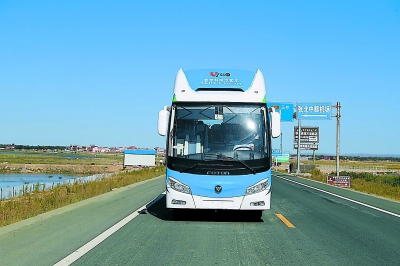

 |
Hydrogen fuel cell passenger cars will be produced in Zhangjiakou City, Hebei province, to serve the 2022 Winter Olympics to be jointly hosted by the city with Beijing, as an automatic production line of hydrogen fuel cell engines recently went operation, Beijing Daily reported on Sept. 1.
The production base established with an investment of 1 billion RMB ($152 million) by Beijing SinoHytec Co., Ltd is projected to manufacture 10,000 vehicles a year after construction of all production lines is completed in 2018.
The hydrogen fuel cell vehicle, with a maximum range of 500 kilometers, can be started at even 30 degrees Celsius below zero, and can be stored at even lower temperatures, which means the vehicles are suitable for the winter weather in Zhangjiakou.
Li Jianqiu, a professor at Tsinghua University, noted that, compared with traditional vehicles that consumes 6 to 8 liters of gasoline every 100 kilometers at a cost of 40 to 50 RMB, the hydrogen fuel cell vehicle consumes only 1 kilogram of hydrogen at a cost of 30 RMB.
About 2.04 million diesel trucks in the Beijing-Tianjin-Hebei region are believed to discharge some 6.48 million tons of pollutants each year, while the hydrogen fuel cell vehicles produce zero emissions and are thus environmentally friendly.
In addition, the hydrogen used as fuel for the vehicles can be discharged in a timely fashion, which ensures safety of the vehicles.
Zhangjiakou is advantageous for developing hydrogen energy as it has a demonstration zone of renewable energy and the world’s largest wind power hydrogen production. Producing hydrogen with wind power not only lowers costs, but makes efficient use of the surplus wind power of more than 10 billion kilowatts of the city on a yearly basis.
 Fire brigade in Shanghai holds group wedding
Fire brigade in Shanghai holds group wedding Tourists enjoy ice sculptures in Datan Town, north China
Tourists enjoy ice sculptures in Datan Town, north China Sunset scenery of Dayan Pagoda in Xi'an
Sunset scenery of Dayan Pagoda in Xi'an Tourists have fun at scenic spot in Nanlong Town, NW China
Tourists have fun at scenic spot in Nanlong Town, NW China Harbin attracts tourists by making best use of ice in winter
Harbin attracts tourists by making best use of ice in winter In pics: FIS Alpine Ski Women's World Cup Slalom
In pics: FIS Alpine Ski Women's World Cup Slalom Black-necked cranes rest at reservoir in Lhunzhub County, Lhasa
Black-necked cranes rest at reservoir in Lhunzhub County, Lhasa China's FAST telescope will be available to foreign scientists in April
China's FAST telescope will be available to foreign scientists in April "She power" plays indispensable role in poverty alleviation
"She power" plays indispensable role in poverty alleviation Top 10 world news events of People's Daily in 2020
Top 10 world news events of People's Daily in 2020 Top 10 China news events of People's Daily in 2020
Top 10 China news events of People's Daily in 2020 Top 10 media buzzwords of 2020
Top 10 media buzzwords of 2020 Year-ender:10 major tourism stories of 2020
Year-ender:10 major tourism stories of 2020 No interference in Venezuelan issues
No interference in Venezuelan issues
 Biz prepares for trade spat
Biz prepares for trade spat
 Broadcasting Continent
Broadcasting Continent Australia wins Chinese CEOs as US loses
Australia wins Chinese CEOs as US loses